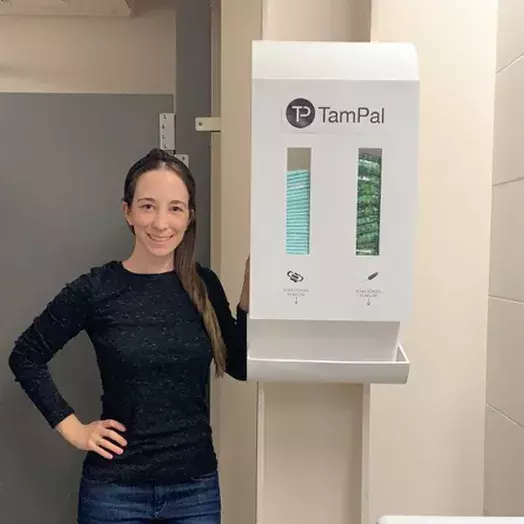
Student wins $35,000 to take feminine hygiene innovation to market
Erica Duffy (MA, Design Leadership/MBA ’21) never saw herself as an entrepreneur. But when she saw a common problem — limited bathroom space to store feminine hygiene products — she put her MA in Design Leadership from the Maryland Institute College of Art and Johns Hopkins Carey Business School MBA to the test and launched TamPal. What originated as a class project grew into a business venture winning $35,000 at a start-up competition open to MA/MBA dual-degree students.
TamPal
“TamPal came from my own frustrations. I had a very small bathroom with no room to store my tampons,” Duffy said. So she designed a feminine product holder prototype during one her classes at MICA. What started as a shelf on a wall soon transformed into a high-tech dispenser for public restrooms.
“I never saw myself being an entrepreneur. But after my time at Carey, I knew I had the opportunities and capacity to try and make TamPal happen,” Duffy said.
Duffy says access to feminine hygiene products “is a basic human need.” Concentrating on accessibility through technology solutions, TamPal will be first available in schools.
TamPal will automatically vend a product of choice, free of charge, after scanning a student ID under the dispenser. Duffy hopes that TamPal will create a stigma-free atmosphere in schools, and that students will feel comfortable accessing the dispenser when needed.
Although there are feminine product dispensers in many public bathrooms, the majority sit unserviced and empty or require payments. Tampal’s technology automatically reorders when inventory is low and helps troubleshoot jams.
“We aren’t stopping there,” Duffy said. “We hope to have TamPal more accessible and branch out to more than just schools.”
Dual-degree takeaways
Duffy credits her dual degree (MA in Design Leadership from MICA and MBA from Carey Business School) with giving her the skills to launch her company.
“Not many programs in the world have what Carey offered; the creative and innovative aspects and the opportunity to study at a true business school. This dual degree program really married two institutions that are experts in what they do,” Duffy said.
She used both her business and design skills to imagine and launch the company.
“When I sat down to create my business plans, I knew where to start. Having been in product development courses, I was able to use the skills I had learned and turn those directly into results,” Duffy said.
The dual degree from MICA and Johns Hopkins also gave Duffy the opportunity to fund her start-up.
Pitching to win
Knowing she had the opportunity to continue building out her TamPal design, Duffy entered the MICA UP/Start Venture Competition; a competition open to Carey’s dual-degree MA/MBA students to showcase their start-up companies with the chance to win funding.
The UP/Start Venture Competition provides mentorship and funding to participants to help their business ventures become a sustainable reality. MICA was offering $100,000 in seed funding to the winners.
Once Duffy entered the competition, she was tasked with putting together a pitch deck for TamPal. Passing through the first round, Duffy was invited into the cohort with other start-up businesses pursuing different areas of design.
After submitting multiple business and financial plans, along with a prototype and video advertisement to a new panel of judges for each round, Duffy was chosen as one of the eight winners to receive funding for her start-up, securing $35,000. She now has the means to pursue further funding for her start-up and allocate costs for development.
Looking ahead, Duffy and her team are working to launch the first TamPal prototype in schools for the 2022 school year. She is excited to see the product unfold, as “tampons and pads should be as accessible as toilet paper in bathrooms. Period.”


